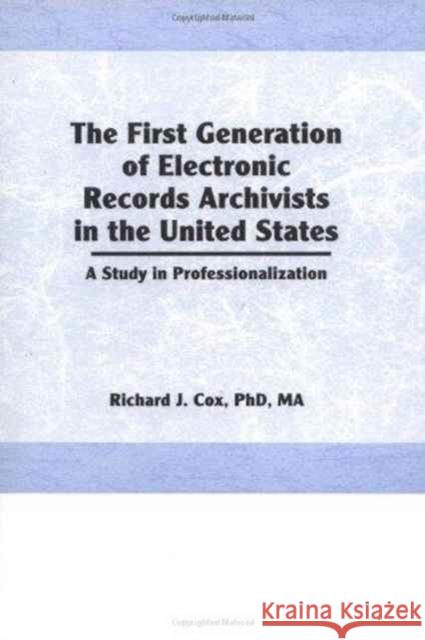The First Generation of Electronic Records Archivists in the United States : A Study in Professionalization » książka
The First Generation of Electronic Records Archivists in the United States : A Study in Professionalization
ISBN-13: 9781560246442 / Angielski / Twarda / 1995 / 220 str.
The First Generation of Electronic Records Archivists in the United States : A Study in Professionalization
ISBN-13: 9781560246442 / Angielski / Twarda / 1995 / 220 str.
(netto: 513,10 VAT: 5%)
Najniższa cena z 30 dni: 528,93
ok. 16-18 dni roboczych.
Darmowa dostawa!
This book helps readers understand the current status of archivists in the United States. It addresses issues of professionalization by re-examining two major aspects of the archival community: institutional forms and structures, and the basic educational foundations that are important to any profession. While United States archivists now seem poised to develop new approaches to the management of electronic records, including research and education venues, this profession's long journey to reach this point is an interesting step on the continuing road to professionalization. The First Generation of Electronic Records Archivists in the United States represents the first major study of how and why American archivists have struggled to contend with the management of electronic records. The book provides a framework for studying this issue, includes suggestions for additional research, and serves as a basis for discussion about the continued strengthening of the archival profession.
This book helps readers understand the current status of archivists in the United States. It addresses issues of professionalization by re-examining two major aspects of the archival community: institutional forms and structures, and the basic educational foundations that are important to any profession. While United States archivists now seem poised to develop new approaches to the management of electronic records, including research and education venues, this profession?s long journey to reach this point is an interesting step on the continuing road to professionalization. The First Generation of Electronic Records Archivists in the United States represents the first major study of how and why American archivists have struggled to contend with the management of electronic records. The book provides a framework for studying this issue, includes suggestions for additional research, and serves as a basis for discussion about the continued strengthening of the archival profession. Despite more than thirty years of striving to manage electronic records, American archivists have not developed an effective infrastructure for this purpose. The First Generation of Electronic Records Archivists in the United States considers the evidence for this failure by evaluating archival literature on the topic of electronic records management. It examines how position descriptions in state government archives and job advertisements across the discipline have reflected a bias toward paper-based formats, and the failure of graduate and continuing archival education programs to deal effectively with electronic records. The book details:
- state government archives and position descriptions
- trends and practices in the Information Age, 1976--1990
- graduate archival education and electronic records: an analysis of current approaches and their strengths and weaknesses
- the effectiveness of the NAGARA Institute as a form of advanced archival education
- problems, challenges, opportunities, and needs for additional researchThe First Generation of Electronic Records Archivists in the United States is an enlightening study for library and information science educators, archival graduate students, and archivists themselves as they work toward the professionalization of their field.











